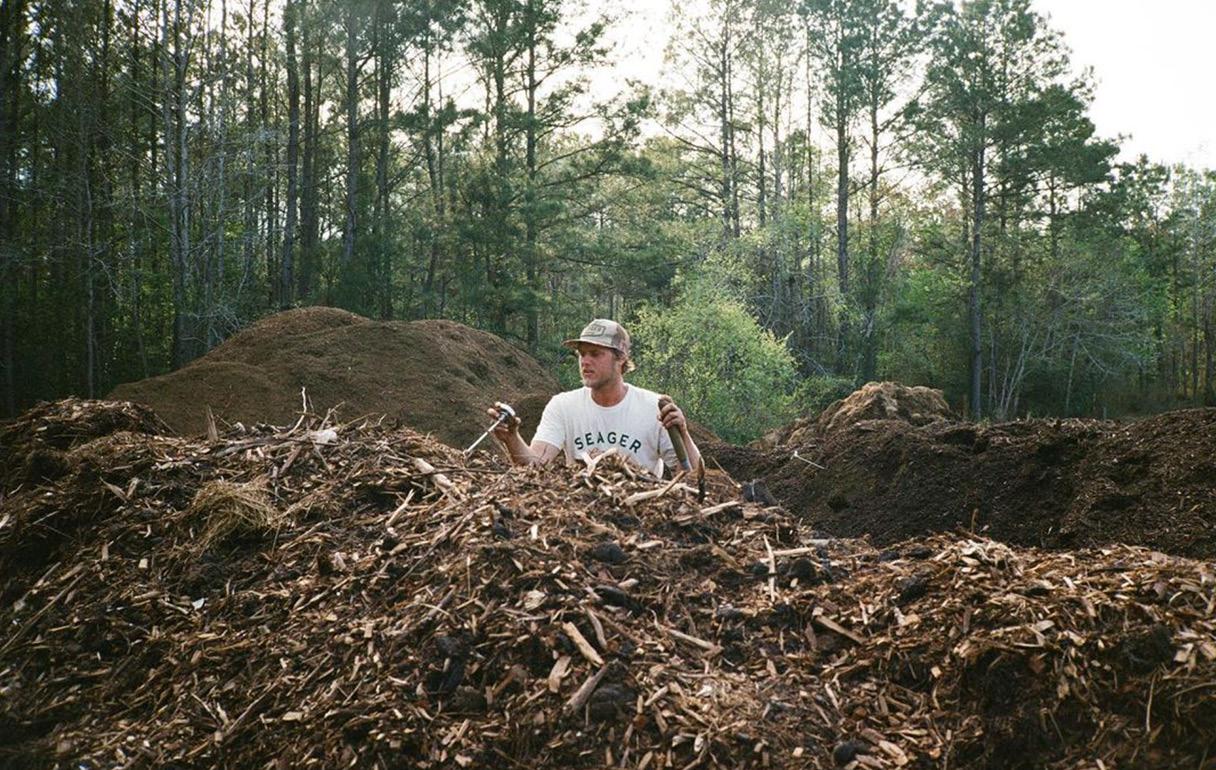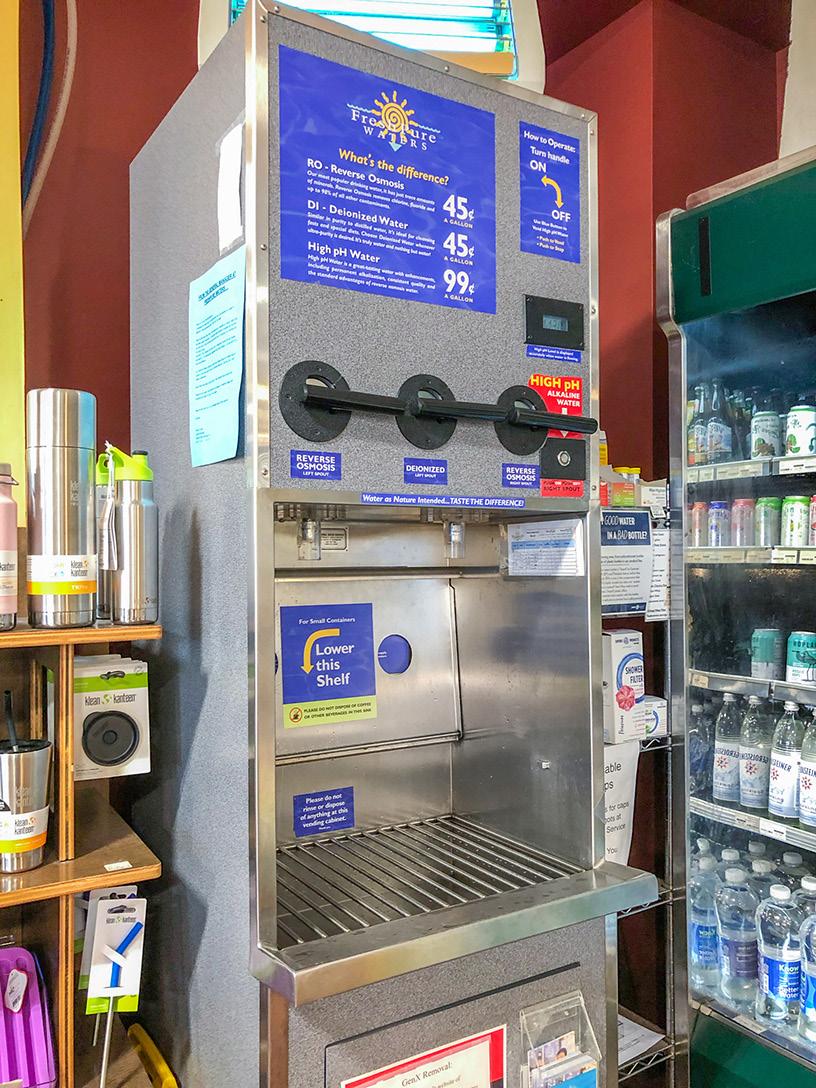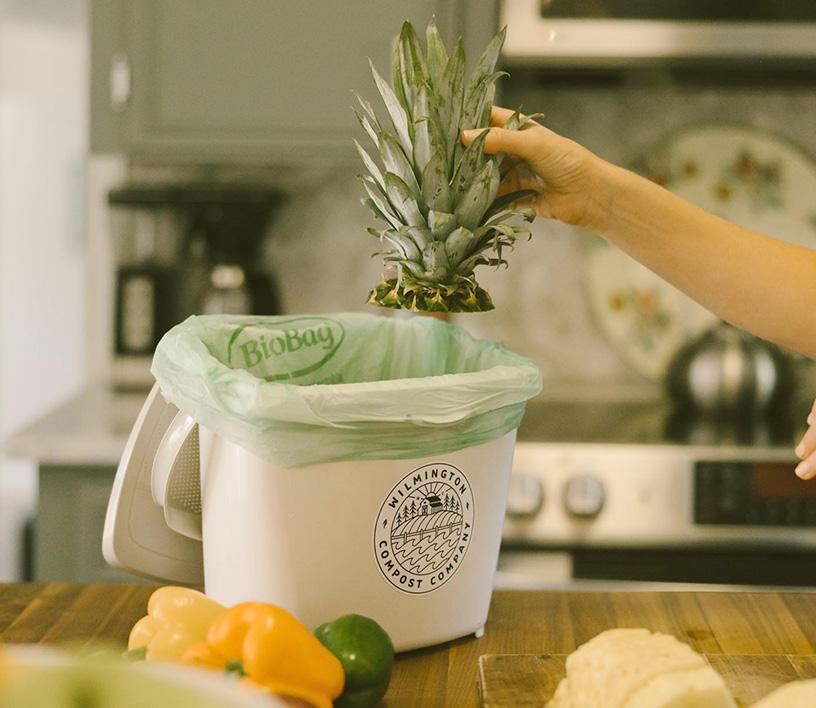
7 minute read
Repurposing the Scraps: Composting Options for Your Everyday Life
composting Repurposing the Scraps: Composting Options for Your Everyday Life
by Shelby Diehl
In 2018, the EPA estimated that 63.1 million tons of food waste was generated across the commercial, institutional and residential sectors, and with the human population ever-growing, that statistic will only continue to rise. With all this food waste, there’s a lack of nutrients being returned to the earth and instead rotting in a landfill. That’s where composting comes in.
Composting is a natural recycling process for any kind of biodegradable matter. While a timely process taking anywhere from a couple of days to over a year, composting rewards more than just the microorganisms weaving through underground systems, but humans too.
“Composting is a positive closed loop of creation between these parts of soil, food and people,” says Riley Alber, founder of Wilmington Compost Company. “Also, as something is beneficial to the soil indirectly it is beneficial to people as people source
(continued on page 9)
photo by Wilmington Compost Company Wilmington Compost Company founder Riley Alber works on a compost pile at Piney Run Farms.
Accessing Clean Water (continued)
In reverse osmosis, a membrane under pressure separates relatively pure water from a less pure solution. Water passes through a semipermeable membrane toward the more concentrated solution because of osmotic pressure. When

photo by Valerie Robertson Customers at Tidal Creek Co-op can fill their own water jugs from the store’s self-serve water processing unit. The per-gallon price depends on whether they choose to fill using the reverse osmosis, di-ionized or high pH water tap. enough counter pressure is applied to the concentrated solution to overcome the pressure, the flow of water reverses.3
Reverse osmosis water can be purchased from a number of retailers around New Hanover County. Local retailers include Whole Foods, Tidal Creek, Southern Water Conditioning and Lovey’s.
Alternatively, if you’re a homeowner, you can install your own reverse osmosis system. Some local options include Whole Water Solutions and Kinetico.
Whole Water Solutions, located in Wilmington, offers customers two system installment options: the first is a 5-stage reverse osmosis system with install; the second is a 5-stage reverse osmosis system with install and an additional remineralization filter. In addition, the company offers fridge hook-ups, annual maintenance and a remineralization filter add-on. Learn more at wholewatersolutions.com.
Kinetico, located in Hampstead, offers a free water analysis service in which a Kinetico expert will determine the cause of your water concerns and provide a personalized solution for your needs and budget. These solutions may include water filtration systems, ion exchange systems, reverse osmosis systems, whole home water purification, disinfection systems or one of their special systems. Learn more at kineticoadvancedwatersystems.com.
As great as these systems are, they aren’t affordable for everyone with the prices being anywhere in the hundreds. And while refillable jugs are a great opportunity, if you don’t have a car, how can you get your refillable jugs from your home to the store and back? There’s still a long way to go in the lower Cape Fear area to make clean water accessible for everyone and to resolve the environmental justice issue plaguing our waterways.
Sources
1 capefearriverwatch.org/genx/ 2 www.cfpua.org/ 3 www.fda.gov/inspections-complianceenforcement-and-criminal-investigations/inspection-technical-guides/ reverse-osmosis Shelby Diehl is a senior at the University of North Carolina Wilmington studying environmental science with a concentration in conservation and creative writing with a certificate in publishing. She is a Going Green contributing editor and plans to pursue a career in environmental writing that will allow her to advocate for environmental causes worldwide.
composting
Repurposing the Scraps (continued)
their food from the soil …. Reducing food waste by composting it, helps the soil; the healthy soil helps people grow healthy food; that food feeds the people in return, benefiting the people’s bodies, minds and communities.”
But what can be composted? According to Wilmington Compost Company, you can compost meat; seafood; vegetables and fruit (remove stickers); tea bags; coffee grounds and filters; bread; rice; egg shells; freezer-burned fruit, veggies and meat; spices/herbs; dairy; grains; candy, cookies and other baked goods; cooked foods; bamboo and palm utensils and plates; and pet food, paper towels, paper towel rolls and used paper food packaging if the items are labeled BPI Certified Compostable.
What’s great about the lower Cape Fear is that you’re not limited in the options you have to compost. Whether you live in a home with a garden or an apartment, there’s a way that you can produce compost—it’s just a matter of how it’s done. With that being said, let’s explore the different ways you can compost regardless of your living situation.
In the ground
When it comes to composting in the ground, there are a couple of reliable techniques, including the dig and drop method and the trench method. Not only are these easy ways you can compost in your backyard, but you’ll balance soil density and pH, enrich your soil and possibly suppress certain pests, diseases and weeds.
Dig and drop composting is a great solution for gardeners who are busy because you don’t have to worry about harvesting your compost. This technique is a simpler, smaller-scale version of trench composting. There are three simple steps to the dig and drop method. First, dig a hole—approximately 10 to 12 inches deep—as wide as you want or need it to be. Second, drop your food scraps and/or any organic matter into the hole. Third, replace the soil and you’re done!
Trench composting is more demanding of space, but it works great in garden beds when you’re able to carefully dig trenches between rows of crops or when the season has ended. To perform the trench method, partners while embracing the mindset of responsible composting. This company has become the local “go-to” composting service in the lower Cape Fear area.
“Composting services offer a unique way for folks to compost who may not be able to compost in-ground or through methods such as trench composting,” says Alber. “In our urban societies, living space, HOA restrictions, time and land availability can make in-ground or trench composting difficult for your standard homeowner. Services eliminate the hard work of the action of composting and make it convenient and easy so those scraps can still be diverted from the landfill.”
There are four steps to the company’s residential service. First, inquire with WCC to sign up for a monthly fee of $30. Second, you’ll receive a labeled compost container that you can fill with food scraps and other compostable materials. Third, the company will pick up your container weekly and leave a new, clean container along with a new Biobag liner. Fourth, all the materials will be diverted from the landfill to produce a local compost source that is redistributed to local farmers, gardeners and soil enthusiasts.
Besides their residential and commercial composting services, the company offers a catalog of products from BioBag USA and EcoProducts from which customers can purchase from for their event or business. This catalog has plant-based items such as
dig a hole 10–20 inches deep so that at least 6 inches of dirt ends up on top of your matter. Next, craft a long trench. Then, place your scraps in it and cover it with the dirt you dug out, or do a bunch at once. Lastly, let the soil’s organisms do their job.
Bins and barrels
If you want to compost your own scraps, but can’t or don’t want to do it in your yard, composting in a bin or repurposing an old rain barrel is a great solution. With the ability to roll your whole bin to turn your compost rather than needing a pitchfork, composting is made convenient. Too, the bin or barrel will retain moisture better than the ground will and you’ll have a neat, clean bin that minimizes odor and is pest free.
When crafting your composting bin or barrel, it’s important to make sure that there’s no holes or places for water to leak out. This way, your soil stays inside and moisture is retained. Silicone sealant is a great option for any spots of worry. It’s beneficial to have a lid as well, so if you opt to roll your bin to turn the compost, the soil doesn’t go flying out.
When it comes to composting in your bin or barrel, you have two options. The first is you can replicate the dig and drop method previously mentioned. Simply fill the object with soil, repeat the steps of burying the scraps in the barrel and covering the scraps, and you’re done! The second option is layering your biodegradable waste with soil as you have scraps, making sure there’s plenty of soil for the composting process to do its thing.
Collection service
However, while composting in a raised source seems like an easy fix for people who can’t compost in-ground, there are still limits to how many can do that. So, for those who don’t have access to a yard or the space for a barrel or raised bed, Wilmington Compost Company (WCC) is the way to go.
Wilmington Compost Company was founded by University of North Carolina Wilmington Alumnus Riley Alber. The company, based out of Piney Run Farms in Rocky Point, collects compostable waste material from residential and commercial

photo by Wilmington Compost Company Food scraps being placed into a Wilmington Compost Company composting bucket lined with a Biobag.










